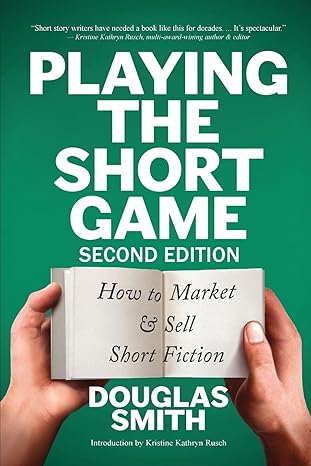Book Review: Playing the Short Game
This review was originally posted in our weekly email newsletter a few months ago. The author has since joined us to talk specifically about selling short fiction in Training #581. Here are my top takeaways from his book:
I recently finished reading the second edition of “Playing the Short Game: How to Market & Sell Short Fiction” by Douglas Smith.
I haven’t written much short fiction since the 90s, but it’s always been on my radar as something I want to explore more. Douglas's book is a really practical guide, and I found it a pretty straightforward read, packed with actionable advice from someone who's clearly walked the walk with hundreds of publications and awards.
This isn’t something you’d read to hone your craft; mind you…this book is focused on what to do to get your story sold into a professional market and beyond.
One of the first things that really struck me, and he calls it the most important chapter, is the deep dive into licensing rights. It's a fundamental shift in thinking for many of us – we’re not selling our stories outright, but licensing specific rights for specific uses. That’s a powerful concept to get your head around, and he explains it very clearly.
I also found his advice to “start at the top” when submitting stories really compelling. His argument is that targeting the best professional markets first is crucial, because sales to lower-paying or non-pro markets can actually make it harder to sell to top-tier publications later. It’s a bold strategy, and one that might feel counterintuitive if you're just starting out, but he makes a strong case for it.
His take on the submission process and rejections is refreshingly candid. You need to be persistent and “keep your story in the mail” until it sells. Expect rejections, he says, (many of them!) before a story finds its first home. That’s a mantra any writer, regardless of what they're writing, can probably relate to!
And his thoughts on reviews? He describes them as simply “one person's opinion” and suggests writers should ideally avoid reading them to protect their confidence. He emphasizes that the professional sale is what truly matters. Frankly, that’s good advice no matter what length of story you are writing.
It was also really insightful to see how he breaks down the ways writers can leverage the rights they retain to generate more income from already published stories. Think reprints, foreign language translations, audio rights, and eventually, publishing collections. It’s all about making your existing work continue to work for you.
While he does touch on indie publishing as a good option for your backlist and collections, he generally recommends against it for initial first rights sales, mainly because of the potential loss of career benefits that professional markets can offer. That was an interesting perspective for me.
He even includes a direct appeal to certain publishers to stop practices that can harm new writers, such as paying below professional rates for first rights or charging submission fees. It’s good to see an author advocating for the community.
If I had to boil down his core message from the book, it would be something like this (though he goes into much more detail, of course!):
- Keep writing.
- Start at the top.
- Keep it in the mail.
- Guard your rights.
- Leverage your backlist.
At the end of the day, I think “Playing the Short Game” is a fantastic resource if you're looking to understand the business side of selling short fiction. Even if you're primarily focused on novels, I think it's still worth a look. Douglas makes some convincing arguments for why working on your short fiction skills can be a great way to bring in new audiences and even hone your craft.
You can find the book on Amazon* as well as at other retailers. Doug has also generously offered a 25% off coupon if you purchase directly from his website: APEX2025
And as a reminder, you can hear Douglas discuss many of these concepts in more detail in Training #581 – How to Sell Short Fiction.
*We may receive a small commission from any Amazon orders at no additional cost to you if you use our link.


